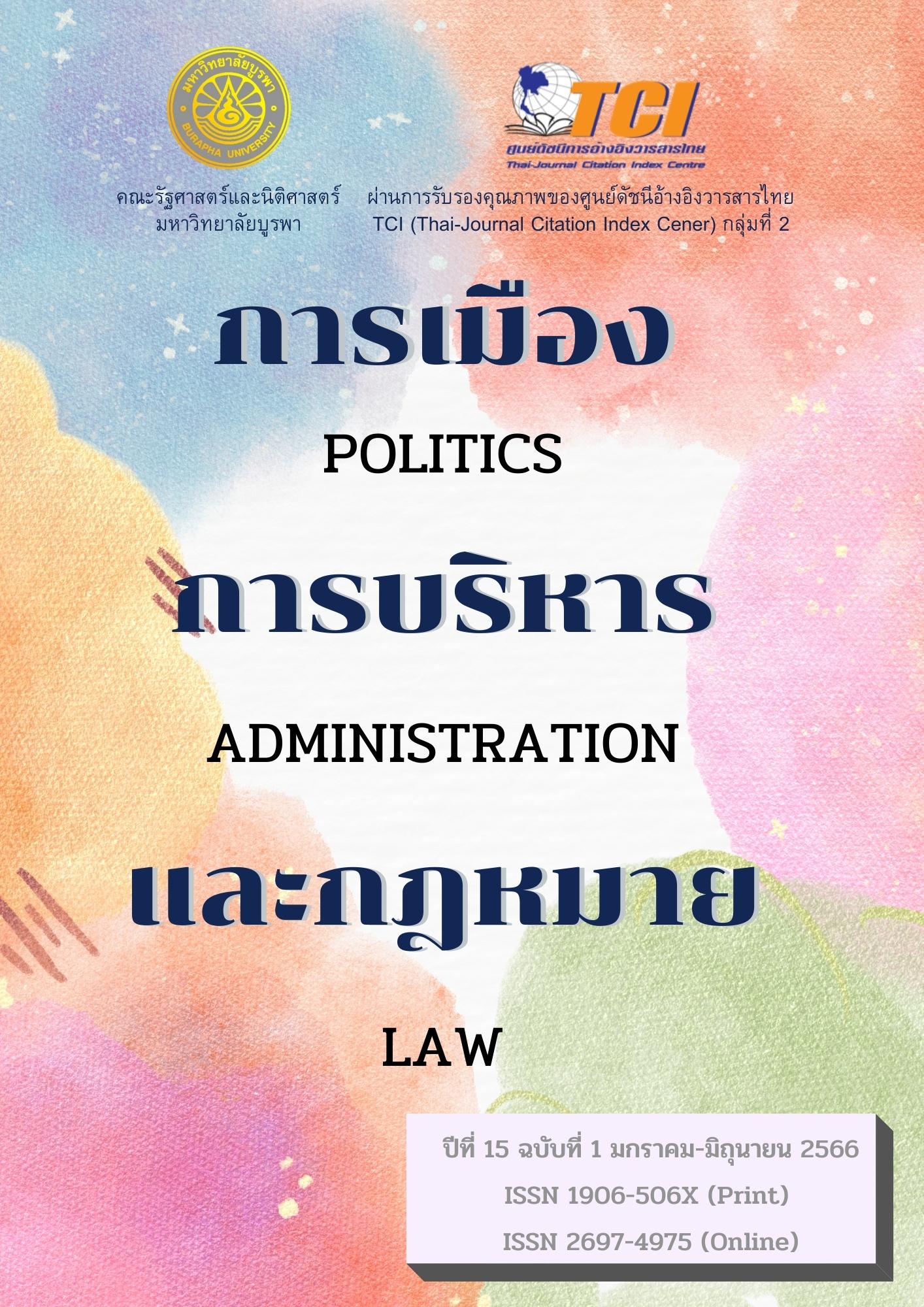Developing an enterprise management system to community business leader strengthen on the way of community-based tourism
Developing an enterprise management system to community business leader strengthen on the way of community-based tourism
Abstract
This research aims to study the feasibility of financial return for Community Enterprise Management System for Thai Muslim Village Tourism and study the development guideline for Sustainable Tourism of Community Enterprise by focusing on career generating. The methodology of this research consists of 3 steps as the following; 1) study the context and potential of the community in community enterprise management system for Thai Muslim Village Tourism 2) study the feasibility of community enterprise management system for Thai Muslim Village Tourism and 3) study the development guideline of community enterprise for sustainable tourism by focusing on career generating by Participatory Action Research (PAR).
From the result of the feasibility study of Developing an enterprise management system to community business leader strengthen on the way of community-based tourism by focusing on career generating and income & expense estimation, the careers which create the income and high feasibility are visit receptionist and selling goat milk products such as yogurt and pasteurized milk. The research team has studied the feasibility of community enterprise for community-based tourism and found that there is a high possibility for community-based tourism to get the payback within 10 months. Moreover, from the study of guideline of community enterprise for sustainable tourism by focusing on career generating, the management system has high possibility because the guideline is matched to the lifestyle of the community and allow the community to participate in every sequence which consists of 1) Participation in community activities 2) Application of Sufficiency Economy Concept to practice in the community 3) Learning system by local wisdom as the core and 4) The development, conservation and restoration of the ecosystem and the environment which conducive to the lifestyle of the community. For systems and mechanisms of Community Enterprise Management System for Thai Muslim Village Tourism, for the Input, it is free to be a member and it is the process of the voluntary invitation, for the process of financial management, the community enterprise sets the regulation that there will not be the dividend as the money but it will be consumer goods. For the output, there are 18 households who participate in activities or 20.93% for the outcome, there is the development of the community enterprise by developing the prototype community from community-based tourism and allow agriculturists from other villages to participate in raw materials supply for the community to produce the processed products for sale. Moreover, there will be the products which can be stored for a long time such as Milk tablet and Powdered milk. Then, the community enterprise will be developed as the cooperative village. From this development, the leader predicts that the village will get more support from organizations.
References
กรมส่งเสริมการเกษตร. (2562). คู่มือการดำเนินกิจการวิสาหกิจชุมชน. กรุงเทพฯ: กรมส่งเสริมการเกษตร.
กระทรวงการท่องเที่ยวและกีฬา. (2565). รายงานเศรษฐกิจการท่องเที่ยว. วันที่ค้นข้อมูล 12 ตุลาคม 2565, เข้าถึงได้จาก https://www.mots.go.th.
จินดาภา ลีนิวา อัจฉรา เขมอัครเจตต์ และเบญจวรรณ เบญจกรณ์. (2564). คุณลักษณะภาวะผู้นำที่ส่งผลต่อ สมรรถนะการบริหารของผู้นำชุมชนท้องถิ่น กรณีศึกษา เทศบาล
ตำบลนางแล อำเภอเมืองเชียงรายจังหวัดเชียงราย. HRD JOURNAL, 12(2), 41-57.
จินตวีร์ เกษมศุข. (2554). การสื่อสารกับการเปลี่ยนแปลงของสังคม. กรุงเทพฯ: สำนักพิมพ์จุฬาลงกรณ์มหาวิทยาลัย.
ณรงค์ เพ็ชรประเสริฐ. (2542). ธุรกิจชุมชน: เส้นทางที่เป็นไปได้. กรุงเทพฯ: สำนักงานกองทุนสนับสนุน การวิจัย.
เทิดชาย ช่วยบำรุง. (2552). บทบาทขององค์กรปก ครองส่วนท้องถิ่นกับการพัฒนาการท่องเที่ยวอย่างยั่งยืนบนฐานแนวคิดเศรษฐกิจพอเพียง. นนทบุรี: สถาบันพระปกเกล้า,
วิทยาลัยพัฒนาการปกครองท้องถิ่น.
ธีระพงษ์ แก้วหาวงษ์. (2543). กระบวนการเสริมสร้างชุมชนเข้มแข็ง ประชาคม ประชาสังคม. ขอนแก่น: โครงการจัดตั้งมูลนิธิเสริมสร้างชุมชนเข้มแข็ง ชมรมนักวิชาการ
สาธารณสุขภาคตะวันออกเฉียงเหนือ.
ธีระวัฒน์ จันทึก. (2559). การมีส่วนร่วมในกำลังแรงงานของประชากรผู้สูงอายุที่มีผลต่อการเสริมสร้างศักยภาพความเข้มแข็งทางเศรษฐกิจของชุมชนจังหวัดเพชรบุรี.
เศรษฐศาสตร์และบริหารธุรกิจปริทัศน์, 12(2).
ธีระวัฒน์ จันทึก. (2560). การพัฒนาอาชีพชุมชนตามอัตลักษณ์หมู่บ้านมุสลิมด้วยศูนย์บริหารจัดการบ้านต้นแบบเศรษฐกิจพอเพียง. สำนักงานคณะกรรมการวิจัยแห่งชาติ (วช.)
สำนักงานกองทุนสนับสนุนการวิจัย (สกว.) และมหาวิทยาลัยศิลปากร.
ธีระวัฒน์ จันทึก, ปวีณา สปิลเลอร์, ปภาวิน พชรโชติสุธี และธงชัย ทองมา. (2565). การพัฒนากลยุทธ์การสร้างแบรนด์ท่องเที่ยวเขตพัฒนาการท่องเที่ยวฝั่งทะเลตะวันตก.
วารสารวิชาการการตลาดและการจัดการ มหาวิทยาลัยเทคโนโลยีราชมงคลธัญบุรี, 9(2), 54-81.
ปราณี ตันประยูร. (2557). การศึกษาการบริหารจัดการด้านการท่องเที่ยวและรูปแบบการบริหารจัดการการ ท่องเที่ยวอย่างเป็นธรรม โดยการมีส่วนร่วมของชุมชน กรณีตลาด
โบราณลาดชะโด อำเภอผักไห่ จังหวัดพระนครศรีอยุธยา. รายงานการวิจัยฉบับสมบูรณ์ คณะวิทยาการจัดการ, มหาวิทยาลัยราชภัฏพระนครศรีอยุธยา.
พิทักษ์ ศิริวงศ์ และคณะ. (2558). การพัฒนาแนวทางบริหารจัดการชุมชน แบบมีส่วนร่วม เพื่อรองรับการจัดการท่องเที่ยวเชิงเกษตรแบบมีอัตลักษณ์ในพื้นที่ชุมชนหมู่บ้านมุสลิม.
กรุงเทพฯ: สำนักงานคณะกรรมการวิจัยแห่งชาติ.
พิมพ์วิภา ตราชูวณิช และณัฐพงศ์ พันธ์น้อย. (2565). พฤติกรรมการท่องเที่ยวของนักท่องเที่ยวคุณภาพในบริบทประเทศไทย. สาระศาสตร์, 3, 497-508.
รัชนี รูปหล่อ, ดุษฎี พรหมทัต และวัลภา ว่องวิวิธกุล. (2556). แนวทางการพัฒนาสู่ความยั่งยืนและ เจริญเติบโตของวิสาหกิจชุมชน. ใน วารสารวิชาการและการวิจัย มหาวิทยาลัย
เทคโนโลยีราชมงคลพระนคร ฉบับพิเศษ การประชุมวิชาการมหาวิทยาลัยเทคโนโลยีราชมงคล ครั้งที่ 5 (158- 171). กรุงเทพฯ: มหาวิทยาลัยเทคโนโลยีราชมงคลพระนคร.
วรวรรษ เทียมสุวรรณ, วัชรพล วิบูลยศริน, ศิโรจน์ ผลพันธิน และเหม ทองชัย. (2562). ภาวะผู้นำเชิงกลยุทธ์ในศตวรรษที่ 21. วารสารวิชาการบัณฑิตวิทยาลัยสวนดุสิต, 15(2),
-231.
วันทนา เนาว์วัน ลำยอง ปลั่งกลาง และชุมพล พืชพันธ์ไพศาล. (2557). การพัฒนาการท่องเที่ยวเชิงสร้างสรรค์สัมผัสภูมิปัญญาท้องถิ่น กรณีศึกษา: ผลิตภัณฑ์อาหาร วัฒนธรรม
มุสลิม ชุมชนเมืองเทศบาลนครพระนครศรีอยุธยา จังหวัดพระนครศรีอยุธยา. คณะวิทยาการจัดการ, มหาวิทยาลัยราชภัฏพระนครศรีอยุธยา.
สุดถนอม ตันเจริญ. (2561). การจัดการการท่องเที่ยวโดยชุมชนเพื่อการพัฒนาการท่องเที่ยวอย่างยั่งยืน. วารสารวิชาการมหาวิทยาลัยราชภัฏเพชรบุรี, 8(2), 32-41.
Key1, C., & Vijayan, K. P. (2006). Community Participation and Tourism Attitudes in Belize. Interamerican Journal of Environment and
Tourism, 2(2), 8-15.
Denzin, N. K. (1978). The research act: a theoretical introduction to sociological methods. New York: McGraw-Hill.
Lincoln, Y. S., & Guba, E. G. (1985). Naturalistic Inquiry. Newbury Park, Ca: Sage Publications.
Macmillan, T. T. (1971). The Delphi Technique., Paper Presented at the annual meeting of the California Junior Colleges Associations
Committee on Research and Development, Monterey, California. (May 1971), 3-5.
Schoderbek, P. P., & Others. (1990). Management System: Conceptual Consideration (4th ed.). Homewood, IL: Richard D. Irwin, Inc.,.
World Tourism Organization. (2022). Best tourism villages of 2022 named by UNWTO. Retrieved October 17, 2022, from
https://www.unwto.org/news/best-tourism-villages-of-2022-named-by-unwto
Downloads
Published
Issue
Section
License

This work is licensed under a Creative Commons Attribution-NonCommercial-NoDerivatives 4.0 International License.






